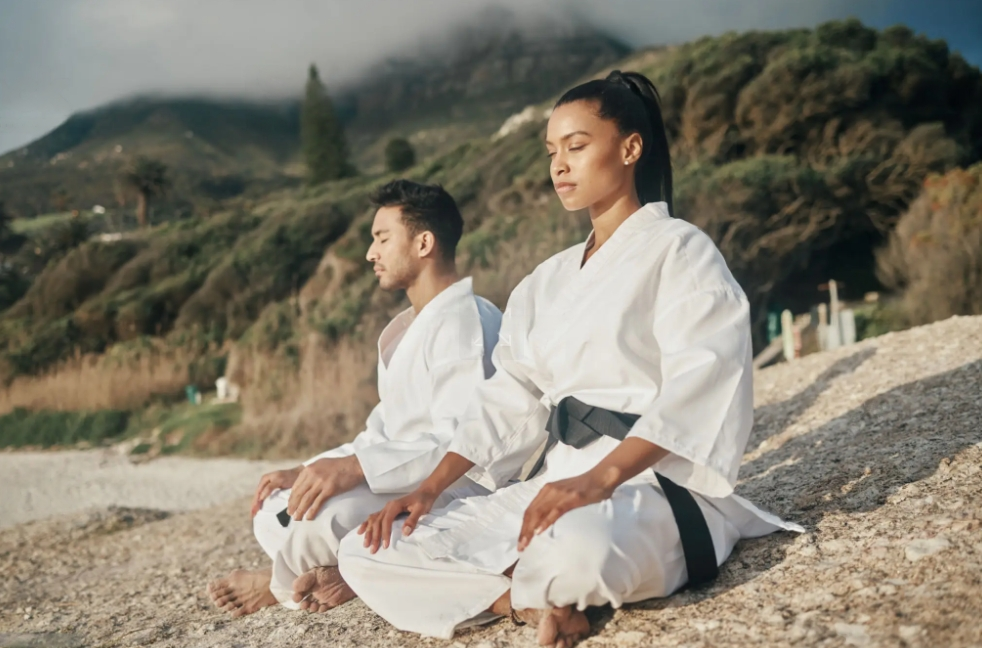The Role of Discipline in Karate Training: Cultivating Mind and Body
The Impact of Discipline in Karate Training Karate, an ancient martial art originating from Okinawa, Japan, transcends physical techniques; it’s a way of life that encompasses discipline, respect, and personal growth. At the core of karate training lies the essential element of discipline, a cornerstone that shapes practitioners mentally, emotionally, and physically. The Essence of Discipline in Karate Discipline in karate extends far beyond mere rule adherence or obedience. It involves cultivating a mindset that embraces dedication, consistency, and self-control. Within traditional karate dojos (training halls), discipline takes center stage the moment students step onto the training floor. Physical Discipline: Mastery Through Repetition Physical discipline manifests through rigorous practice and relentless repetition of techniques. Practitioners devote countless hours perfecting strikes, blocks, and forms. This repetitive training not only refines muscle memory but also instills a robust work ethic, patience, and resilience. Mental Discipline: Focus and Concentration Karate necessitates unwavering mental focus. Practitioners must remain entirely present during training, concentrating on each movement and detail. This mental discipline nurtures mindfulness, enhancing an individual’s capacity to concentrate on tasks beyond the dojo. Emotional Discipline: Resilience and Perseverance The path in karate is marked by challenges, setbacks, and moments of self-doubt. Through disciplined training, practitioners develop emotional resilience and the ability to persist in the face of adversity. This resilience seamlessly translates into various life situations, fostering a “never give up” attitude. Self-Control and Conflict Resolution Discipline in karate encompasses self-control, a crucial skill in both training and daily life. Martial arts practitioners in the Upper West Side, for example, learn to effectively channel their emotions and manage stress. This skill extends into conflict resolution, enabling individuals to respond calmly and thoughtfully in challenging situations. The Role of the Sensei (Instructor) The sensei plays a pivotal role in imparting discipline to students. They serve as role models and mentors, exemplifying the values of respect, humility, and dedication. Through their guidance, students refine their physical techniques and internalize the principles of discipline. Discipline and Personal Growth The cultivation of discipline in karate closely aligns with personal growth. As practitioners advance in their training, they undergo transformations that transcend the physical realm. Confidence, self-esteem, and heightened self-awareness are just a few of the positive changes that discipline nurtures. Life Lessons Beyond the Dojo The discipline learned in karate transcends the training floor. The values instilled in practitioners help mold their character, influencing their interactions, decision-making, and approach to challenges in all aspects of life. Discipline serves as the cornerstone upon which karate is built. It molds practitioners into individuals who embody respect, focus, perseverance, and self-control. The karate journey is not merely about mastering techniques; it’s about mastering oneself. As practitioners embrace the rigors of disciplined training, they embark on a path of holistic growth that enriches the mind, fortifies the body, and shapes a resilient, honorable, and steadfast character in the face of life’s challenges. For authentic karate training that emphasizes discipline and personal growth, turn to Harmony by Karate – teaching martial arts for over 25 years in the Upper West Side of Manhattan, NYC. Contact us today to embark on your journey towards a balanced mind and body through karate.
The Role of Discipline in Karate Training: Cultivating Mind and Body Read More »



